The First Infant of the 2024 Baby Season!
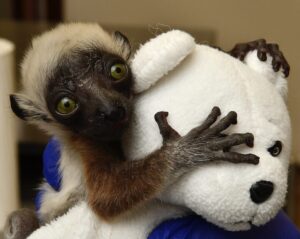
Albus clings to a plush bear during his one-week-old infant wellness exam. Photo by David Haring.
On the morning of December 14, 2023, Lead Primate Technician Danielle Lynch arrived at the Duke Lemur Center and went to check on pregnant Coquerel’s sifaka Rodelinda, only to discover a fuzzy little surprise clinging to mom’s belly! Rodelinda, an experienced mom, had given birth overnight to a healthy male infant weighing 118 grams. Albus, parents Rodelinda and Johann, and older sister Egeria are now a family of four living together here at the DLC.
Like his older sister Egeria, who was named for a Roman consort, Albus gets his name from Ancient Rome. Albus, Latin for “white,” was a common Roman surname and the moniker for a Roman port city (Portus Albus, or “White Harbor”).
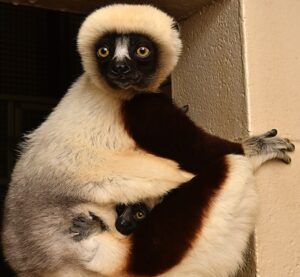
One-month-old Albus clings to Rodelinda’s stomach in what we affectionately call the “fanny pack stage” of infant development. When he gets bigger, he’ll transition to “backpacking” on mom’s back! Photo by David Haring.
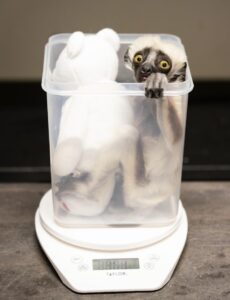
Albus peeks out of his weighing container during his one-month-old infant wellness exam. Photo by Sara Sorraia.
The Power of Positive Reinforcement
In 2006, the DLC established an animal training program to complement the center’s husbandry and research programs. Utilizing positive reinforcement training, the animal care staff began teaching the lemurs how to participate in their own health care and in non-invasive research. Today, behaviors such as voluntarily sitting on a scale or allowing a pregnancy check by a DLC veterinarian have become positive interactions with the animal care staff and help us provide the lemurs with the highest quality of care.
Danielle Lynch, the primary caretaker for the family of Coquerel’s sifakas, has been training Rodelinda on voluntary infant removal for the past few years. Rodelinda has learned to let Danielle gently remove her infant for weighings and wellness exams, in exchange for a peanut. This allows our veterinary team to perform examinations on Rodelinda’s infants with minimal stress to mom. Thanks to the trust built between lemur and caretaker, Danielle has been able to remove Albus from Rodelinda’s belly for routine wellness checks since the day he was born.
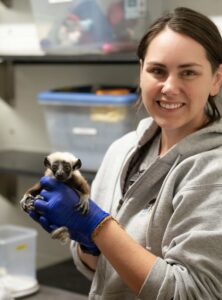
Lead Primate Technician Danielle Lynch holding one-month-old Albus during a wellness exam. Photo by Sara Sorraia.
Caring for a Dynamic Family
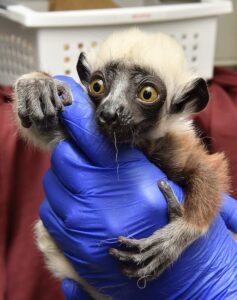
One-month-old Albus is “growing like a weed at each weigh-in,” according to Danielle. Photo by David Haring.
Danielle has watched Rodelinda’s family adjust to the new infant since Albus’ birth. “Rodelinda is a seasoned mom and does a great job raising infants,” she says, “and Johann acted like a seasoned pro with Albus, since this is his second infant.”
While Rodelinda and Johann are no strangers to newborns, big sister Egeria has had a different experience. “Egeria is learning to be a big sister,” Danielle comments. “Egeria doesn’t quite understand yet that Albus isn’t ready to play, so she spends most of her time having huge play sessions with dad.”
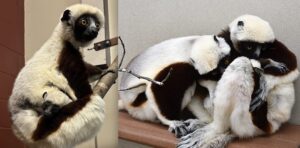
The best way for a juvenile lemur to build parenting skills is to help mom raise younger siblings! One-year-old Egeria takes turns carrying Albus (left) and participates in family grooming sessions (right). Photos by Danielle Lynch (left) and David Haring (right).
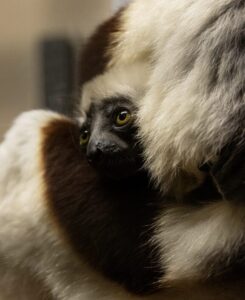
Albus has started exploring the world, but he always returns to the safety and comfort of mom’s belly. Photo by Aditya Baliga.

